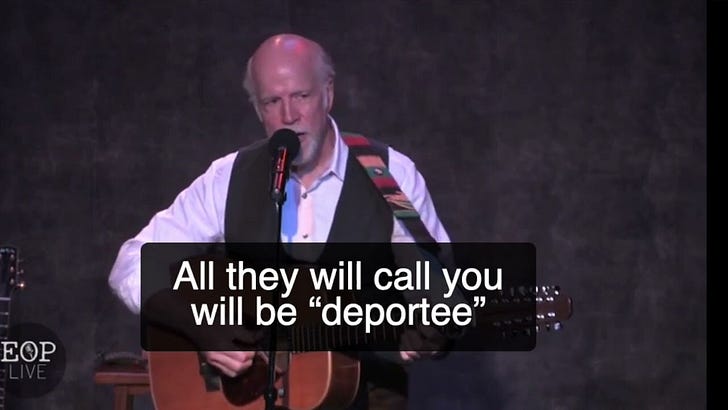"Deportees" have names
"This song is a reminder that the small things we do in this life matter."
Hi all,
Thank you for joining me for this week’s song, Deportee.
If you’d like to hear the song before you read my introduction to John McCutcheon’s video, I’ve included his video just below this article.
For Japanese students, vocabulary words in bold are provided in Japanese below the video.
The Song
(345 words)
“On the 28th day of January, 1948, a plane took off from San Jose, California, bound for El Centro, California.”
This is how John McCutcheon begins his introduction in his performance video of the song, Deportee. The song was written by Woody Guthrie in 1948. Woody Guthrie was a folk singer who traveled around the U.S., meeting people from different backgrounds and occupations. He listened to their stories and then he wrote songs about their lives and about his observations of the injustices in the United States.
John McCutcheon tells very simply the story behind this song that Woody Guthrie wrote, so I won’t rewrite it here. However, there are some things that might not be familiar to students outside the U.S.
The Immigration and Naturalization Service (INS) is a part of the government. It it responsible for immigration issues and to process applications for citizenship to the U.S. It is also responsible for sending people who are in the U.S. illegally back to their home countries. This is called deportation, and the people are referred to as deportees.
From 1942 to 1964, the government had a policy under which people who owned large farms could hire temporary workers from Mexico. These workers were able to enter the U.S. legally and stay until their contract ended. Then they had to return to Mexico. This was call the bracero program. Bracero is Spanish for a Mexican worker allowed to enter the U.S. under these conditions.
In the song, you will hear the phrase, Both sides of the river. This refers to the Rio Grande River which is the line that separates Mexico from the state of Texas in the U.S. Thousands of workers have died trying to cross the Rio Grande in search of work in the U.S.
All They Will Call You: Camino de Sol Series by Tim Z. Hernandez is available on Audible.com. It is an EXCELLENT piece of research into the lives and families of those who died in the crash. It is also sold on Amazon in hardcover or eTextbook.
VOCABULARY
occupation 職業
injustice 不公平
Immigration 入国管理局
Naturalization 帰化
application 申請
deportation 国外退去
Vocabulary in the video
inevitably 必然的に
all on board were lost 飛行機内の全員が亡くなった
to pen 書く
be informative 情報を伝える
buried 埋葬される
mass grave 集団墓地
roadie ローディー(アーティストの楽器全般を扱う仕事)
overcrowding 過密状態
acre エーカー
obvious 明らか
headstone 墓石
anonymous 匿名
put in charge 担当にされた
archdiocese 大司教区
simultaneously 同時進行で
Labor Day 労働者の日
generosity 寛大さ
unveiled 除幕式
a good deed 善行
decade 10年
rot 腐敗
creosote dumps クレオソート (at one time, farmers put creosote on piles of low-quality oranges that could not be sold. This was a way to make sure that they could make money from their orange and that no one would steal the unused oranges for some other use.)
wade 水の中を歩く
outlaws 無法者
rustlers 牛泥棒
thieves 窃盗団
scatter 撒く
‘neath (beneath, under)





(Can I comment on my own post?) ;-)
According to Pete Seeger, Woody heard the news report on the radio and wrote a poem about the event, but due to his failing health, he never sang the song.
The melody was written by Martin Hoffman, a college student, who taught it to Pete Seeger who went on to record the song. Martin's life had a very sad ending, but his tune set to Woody’s poem lives on.
Found in "All They Will Call You: Camino de Sol Series" by Tim Z. Hernandez.
Louise,
This was my first time encountering Deportees, and I’m grateful you offered it with such thoughtfulness. Listening and reading through it, I felt something stir beneath the surface—something I often sit with as a German: the central place of dignity in our constitutional law, and the deep contradiction between that principle and the culture of objectification we still live in—on both sides of the Atlantic.
To me, that’s what this song names. Not just a tragic event, but a quiet and ongoing violence: the stripping away of identity through language, policy, and neglect. When people are reduced to a label—deportee—they are treated as disposable. As less than. As other. And that is where dignity fractures.
This song, and your framing of it, calls that out—not with blame, but with witness. It reminds me that dignity begins in recognition. In naming. In refusing to look away.
Thank you for bringing this into the light, and for reminding us that how we speak, how we remember, and how we listen are all acts of care—and resistance.